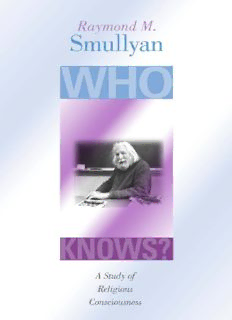
Who Knows?: A Study of Religious Consciousness PDF
Preview Who Knows?: A Study of Religious Consciousness
WHO KNOWS? WHO K NOWS? AStudy of Religious Consciousness Raymond M. Smullyan This book is a publication of Indiana University Press 601 North Morton Street Bloomington, Indiana 47404-3797 USA http://iupress.indiana.edu Telephone orders 800-842-6796 Fax orders 812-855-7931 Orders by e-mail [email protected] © 2003 by Raymond Smullyan All rights reserved No part of this book may be reproduced or utilized in any form or by any means, electronic or mechanical, including photocopying and recording, or by any information storage and retrieval system, without permission in writing from the publisher. The Association of American University Presses’ Resolution on Permissions constitutes the only exception to this prohibition. The paper used in this publication meets the minimum requirements of American National Standard for Information Sciences—Permanence of Paper for Printed Library Materials, ANSI Z39.48-1984. Manufactured in the United States of America Library of Congress Cataloging-in-Publication Data Smullyan, Raymond M. Who knows? : a study of religious consciousness / Raymond Smullyan. p. cm. Includes bibliographical references and index. ISBN 0-253-34198-1 (alk. paper) — ISBN 0-253-21574-9 (pbk. : alk. paper) 1. Religion. 2. Hell. 3. Future life. 4. God. 5. Christianity. 6. Gardner, Martin, 1914– Whys of a philosophical scrivener. 7. Bucke, Richard Maurice, 1837–1902. Cosmic consciousness. I. Title. BL50 .S59 2003 210—dc21 2002008868 1 2 3 4 5 08 07 06 05 04 03 I believe all religions are true. —Walt Whitman I believe no religions are true. —Anonymous CONTENTS preface | ix I Wherefore the Whys | 1 II Through Dark Clouds | 47 III Cosmic Consciousness | 97 references | 135 index | 137 PREFACE Is there really a God, and if so, what is He (She? It?) actually like? Is there really an afterlife, or is the belief in one mere superstitious, primitive, childish, wishful thinking? Is there actually one scrap of scientific evidence either for or against the possibility or probabil- ity of an afterlife? And if there is an afterlife, is there really such a thing as eternal punishment for unrepentant sinners, as many or- thodox Christians and Moslems believe? And if there is, is God un- willing or unable to relieve the sufferings of those in Hell? Is it true, as St. Augustine said, that God could save everyone,if He wanted to, and the reason He doesn’t is that He will not? Could a kind God really allow such a horrible thing as Hell, or is the belief that it is horrible due to the fallen nature of Man, as some orthodox religion- ists claim? After all, there are those like Jonathan Edwards who found the idea of Hell, not horrible, but beautiful! (Before his con- version, he found it horrible, but after his conversion, he found it “sweet.”) Next, what about mystics; are they in possession of some higher knowledge, or are they simply fooling themselves? Is it really true that our unconscious minds are connected to a higher spiritual re- ality, as believed by those like William James, and if so, could this higher spiritual reality be the very same thing that religionists call God?And what about the remarkable idea advanced by those like Richard Bucke and Edward Carpenter, that through the process of evolution, the human race is developing a higher type of conscious- ness called Cosmic Consciousness,which will ultimately enable us to directly perceive that which hitherto was believed merely on faith? Beautiful and optimistic as is this idea, is it a reality or merely a pleasant pipe dream? These are some of the questions addressed in this book. Surely, it is helpful to consider the strongest possible arguments both for and against any theological or philosophical position, and this is what I have tried to do with many of the questions concerned. Mar- tin Gardner—a famous writer on mathematical games and puzzles —has written a book, The Whys of a Philosophical Scrivener,in which many chapters are devoted to theological topics. Part I of my book is a commentary on these chapters. Part II is exclusively on the doctrine of Hell, in which I consider the strongest arguments for
Description: